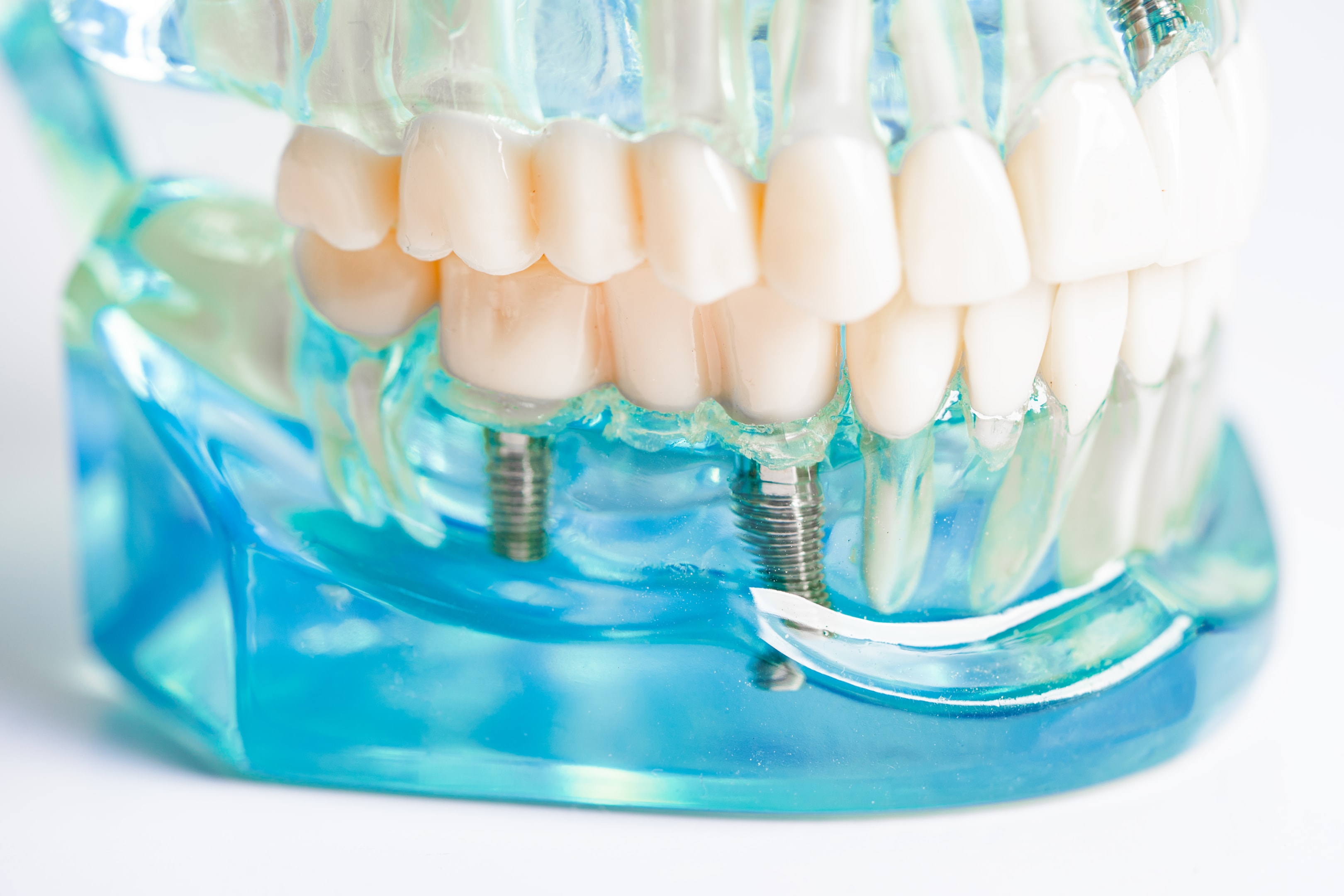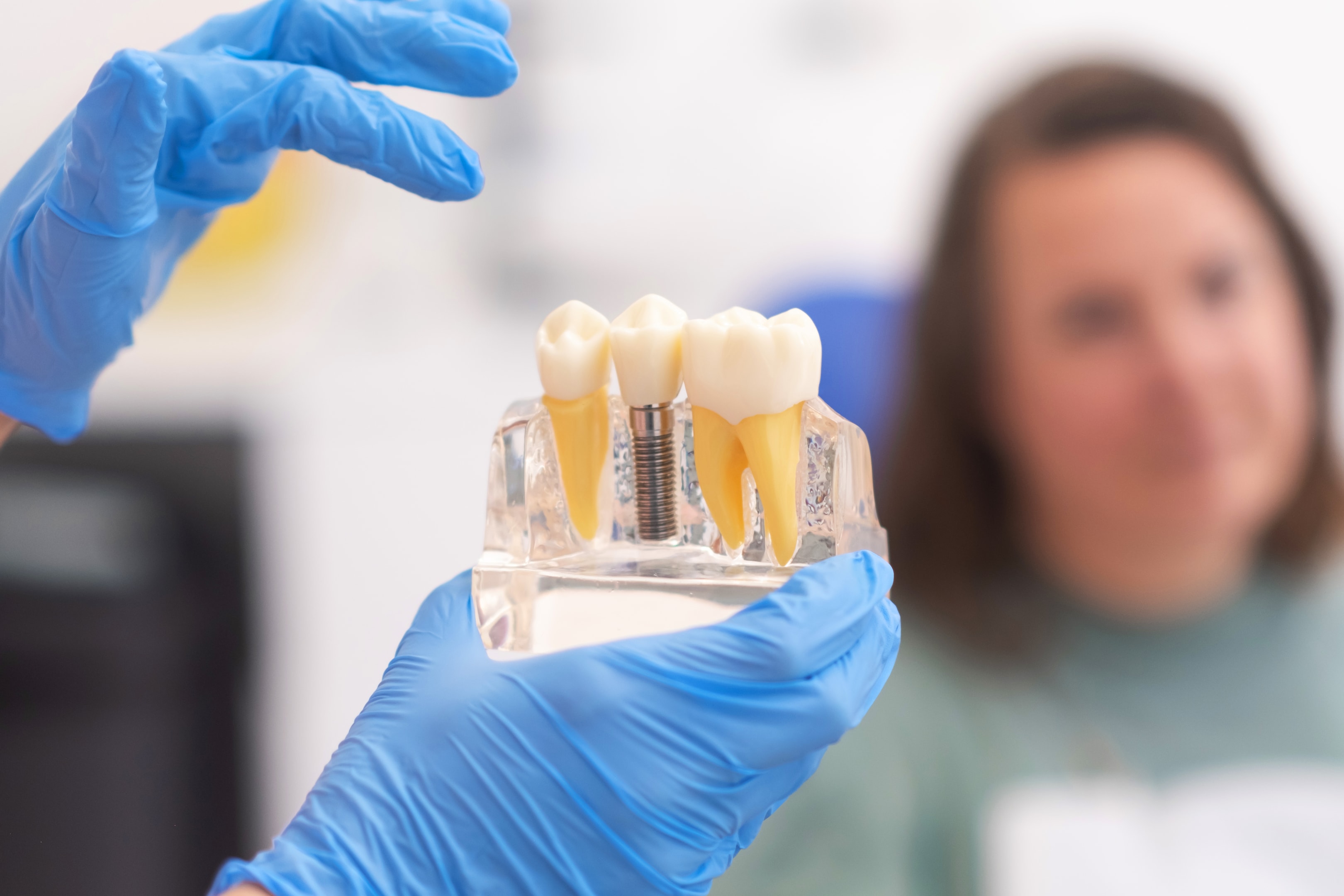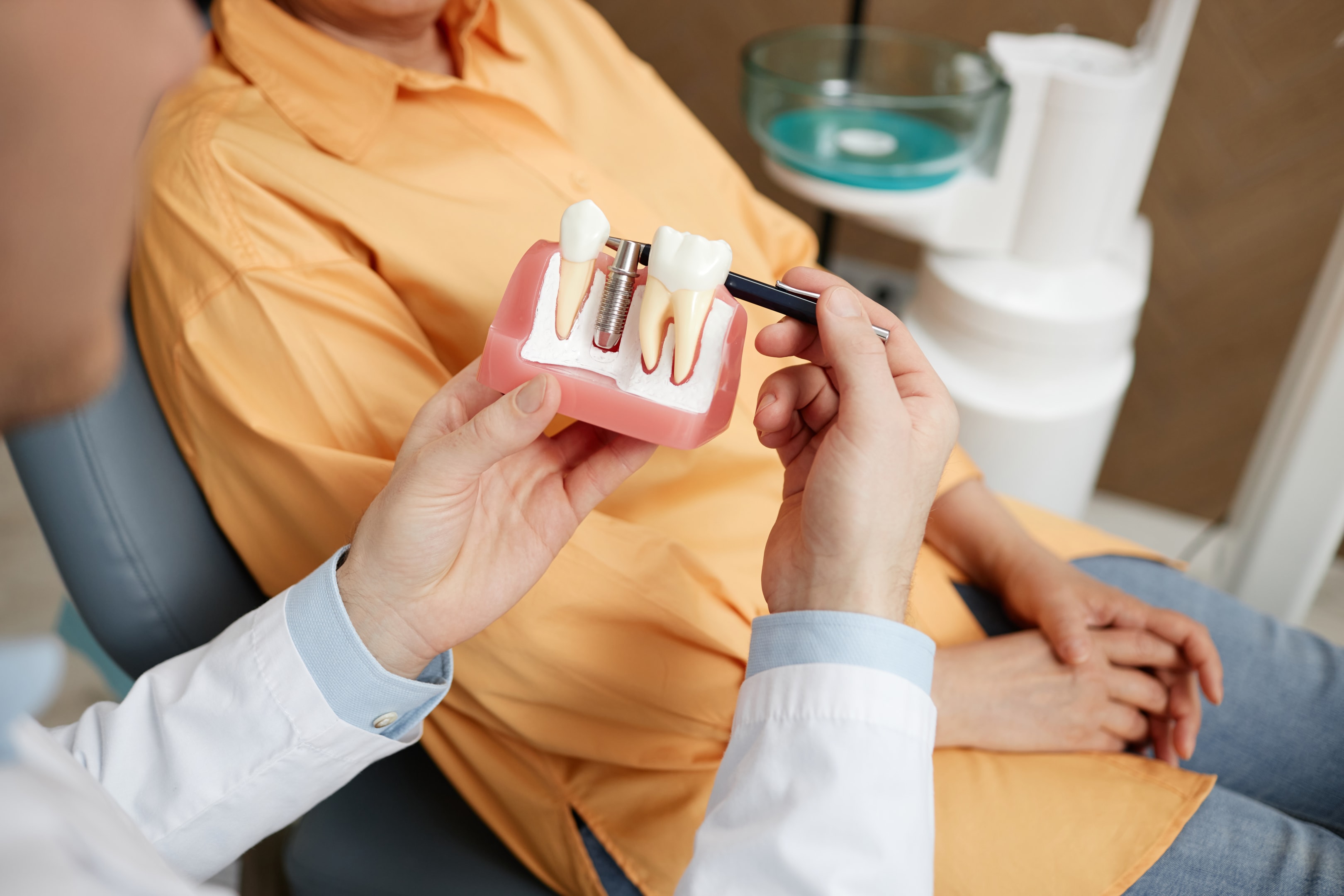
If you’re considering dental implants but are asking, “Do dental implants hurt?”, you’re not alone. This is one of the most common questions patients ask us at South Calgary Oral Surgery.
And rightfully so — oral surgery, no matter how routine, can bring up concerns about discomfort. But here’s the good news: while many people worry about whether dental implant painful, for most patients, the process is far less painful than they anticipate.
In this blog, we’ll explore whether or not dental implants hurt, why you should consider them, and what the entire process entails, from start to finish.
We’ll also discuss pain management, recovery tips, and what you can expect before, during, and after your dental implant surgery.
What Are Dental Implants, and Why Consider Them?

When it comes to replacing missing teeth, dental implants have revolutionized the way we approach oral health.
Unlike dentures or bridges, dental implants mimic the structure of natural teeth, providing a permanent solution that looks and feels just like your original teeth.
So, why should you consider dental implants? Missing teeth can affect more than just your appearance; they can lead to jawbone deterioration, shifting of the surrounding teeth, and even impact your overall oral health.
Dental implants not only restore your smile but also your confidence and function.
But, do dental implants hurt? Let’s break down the process and see how dental implants painful fits into the equation.
Am I a Good Candidate for Dental Implants?
To determine if you’re a good candidate for dental implants, your dentist or oral surgeon will assess your overall health, medical history, and the condition of your teeth and gums. Generally, dental implants are suitable for individuals who:
Have one or more missing teeth: Dental implants are an excellent solution for replacing missing teeth, whether you’re missing a single tooth or multiple teeth.
Have sufficient bone density in the jaw: A strong jawbone is crucial for supporting the dental implant. If you lack sufficient bone density, your dentist may recommend a bone graft to create a stable foundation.
Have healthy gums: Healthy gums are essential for the success of dental implants. If you have periodontal disease, it will need to be treated before the implant procedure.
Are committed to good oral hygiene: Maintaining good oral hygiene and regular dental check-ups are important for the long-term success of dental implants.
Do not have medical conditions that affect healing: Conditions like diabetes or osteoporosis can impact the healing process. Your dentist will evaluate your medical history to ensure you’re a suitable candidate.
Your dentist or oral surgeon may also recommend additional procedures, such as a bone graft, to ensure the success of the dental implant. By carefully evaluating these factors, they can determine the best course of action for your dental health.
Do Dental Implants Hurt During the Procedure?
This is probably the number one question on everyone’s mind: does dental implant surgery hurt? So, let’s address it head-on: do dental implants hurt during the actual procedure?
During the surgical placement of the dental implant, the answer is typically no.
Thanks to advancements in dental technology and the use of local anesthesia or conscious sedation, most patients report feeling minimal discomfort during the surgery itself.
Local anesthesia numbs the implant site, ensuring you won’t feel pain during the procedure. In cases where patients are particularly anxious, oral sedation can be offered to make the experience more comfortable.
One of our patients at South Calgary Oral Surgery, Felicia, shared her experience: “I was so nervous about feeling pain during the procedure, but once the local anesthesia kicked in, I didn’t feel a thing. The oral surgeon was amazing at keeping me calm.”
The Dental Implant Procedure: Step-by-Step Breakdown
Understanding the dental implant surgical procedure can help ease anxiety about potential pain or discomfort.
Here’s how it works:
Initial Consultation – During your first visit, your oral surgeon will evaluate your overall oral health, bone structure, and gum tissue to determine if you’re a good candidate for dental implants. This consultation is pain-free.
Preparation (Bone Graft if Necessary) – If you’ve experienced bone loss, you may require a bone graft to create a stable base for the implant. Bone grafting might sound intense, but it’s a common part of the procedure and is usually done with local anesthesia, minimizing any discomfort.
Dental Implant Placement – During the dental implant surgery, your oral surgeon will insert a titanium post into your jawbone. Thanks to local anesthesia or conscious sedation, you won’t feel pain during this step, even though it involves working in the bone. This titanium post will serve as the “root” for your new replacement tooth.
Healing Process – After the implant is placed, the healing process begins. This period, called osseointegration, allows the implant to fuse with your jawbone. While you may experience some mild post-operative pain during this time, it is typically manageable with prescribed medications and home remedies like cold compresses.
Crown Fitting – Once your jaw has healed, your dentist will place a crown on the titanium post, giving you a natural-looking tooth that blends seamlessly with your surrounding teeth.
Do dental implants hurt during this process?
Most patients describe the pain as minimal, particularly when compared to other dental procedures like tooth extractions.
In fact, many patients are surprised by how painless the entire process feels.
Comparing Pain: Tooth Extraction vs. Dental Implant Procedure
Both tooth extraction and dental implant procedures involve some level of discomfort, but the pain associated with each can vary. Understanding these differences can help you prepare for what to expect.
Tooth Extraction:
Procedure: Tooth extraction is typically a quick and straightforward process. The tooth is removed under local anesthesia, which numbs the area and minimizes pain during the procedure.
Pain Levels: The pain associated with tooth extraction is usually mild and temporary, lasting only a few days. Over-the-counter pain medications like ibuprofen are often sufficient to manage any discomfort.
Dental Implant Surgery:
Procedure: Dental implant surgery is more invasive, involving the placement of a titanium post into the jaw bone. Local anesthesia is used to numb the area, and some patients may also receive sedation to enhance comfort.
Pain Levels: While the procedure itself is generally pain-free due to anesthesia, some patients may experience mild to moderate pain afterward. This discomfort is typically manageable with prescribed pain medications and will go away within a few days.
It’s essential to note that every individual’s pain tolerance and experience may vary. Your dentist or oral surgeon will discuss the potential complications and benefits of each procedure with you and help you make an informed decision.
Post-Surgery Pain: What to Expect After Dental Implant Surgery

After the anesthesia wears off, you may wonder, are dental implants painful after the procedure?
It’s normal to experience some discomfort in the days following the surgery.
The area around the implant site may feel tender, and you might notice swelling in the surrounding gum tissue or jaw bone.
Here’s what you can expect in terms of post-surgery pain:
Initial Recovery Period – The first 24-48 hours after the dental implant procedure are when you’ll likely feel the most discomfort. Many patients describe this pain as similar to the soreness experienced after a tooth extraction.
Pain Levels – The pain levels are generally mild and can be managed with over-the-counter pain medications like ibuprofen. Your oral surgeon may also prescribe stronger pain medications if needed.
Cold Compresses and Ice Packs – Applying an ice pack or cold compress to the surgical area can help reduce swelling and ease pain during the initial recovery period.
Most patients find that the discomfort fades after a few days.
By the end of the first week, you should be able to return to most of your normal activities, although it’s important to avoid strenuous physical activity during this time to ensure proper healing.
Factors Affecting Pain Levels and Recovery
Several factors can impact the level of pain and recovery time associated with dental implant surgery. Understanding these factors can help you manage your expectations and prepare for a smooth recovery.
Age: Older adults may experience more discomfort and a longer recovery time due to decreased bone density and slower healing rates. Younger patients often heal more quickly and experience less pain.
Overall Health: Patients with underlying medical conditions, such as diabetes or osteoporosis, may experience more pain and a longer recovery time. These conditions can affect the body’s ability to heal efficiently.
Gum Health: Patients with healthy gums tend to experience less pain and a faster recovery time compared to those with gum disease. Treating any gum issues before the implant procedure can improve outcomes.
Smoking Status: Smoking can slow down the healing process and increase the risk of complications, leading to more pain and a longer recovery time. Quitting smoking before and after the procedure can significantly improve your recovery.
Medication Use: Certain medications, such as blood thinners, can affect the healing process and increase the risk of complications. Your dentist will review your medication history and provide guidance on managing any potential issues.
Your dentist or oral surgeon will discuss these factors with you and provide personalized guidance on managing pain and ensuring a smooth recovery. By understanding and addressing these factors, you can help ensure the success of your dental implant surgery and enjoy a quicker, more comfortable recovery.
Managing Dental Implant Pain: Tips for a Smooth Recovery
We understand the concern over pain management, so let’s dive into some effective ways to ensure a pain-free recovery.
While dental implants hurt less than most patients expect, you still need to take care of the implant site to avoid complications.
Here are some tried-and-true tips for minimizing pain:
Follow Your Oral Surgeon’s Instructions – Your oral surgeon will provide detailed post-operative care instructions. This may include taking prescribed medications, avoiding certain foods, and practicing proper oral hygiene around the implant site.
Use Cold Compresses – As mentioned earlier, cold compresses can help alleviate swelling and numb the surgical site, reducing discomfort.
Stay on Top of Pain Medications – Don’t wait for the pain to become severe. Take your prescribed medications or over-the-counter pain relievers as directed, especially during the first 48 hours.
Soft Foods Only – Stick to a diet of soft foods during the initial recovery period to prevent irritating the implant area.
Remember, the goal is to make the dental implant process as pain-free as possible. With proper care, most patients experience minimal discomfort and enjoy a quick recovery.
Common Dental Implant Complications: What to Watch Out For

Although dental implants are a highly successful procedure with a success rate of over 95%, there can be rare complications that lead to increased discomfort or pain.
Here are a few things to watch for:
Infection – If bacteria enter the surgical site, an infection can develop. Symptoms include increased discomfort, swelling, and redness in the area.
Nerve Damage – While rare, improper implant placement can cause nerve damage, leading to long-term numbness or pain in the jaw or gums. This is why choosing an experienced oral surgeon is crucial.
Implant Rejection – In some cases, the body may reject the dental implant, leading to increased pain. Symptoms include persistent discomfort, swelling, or even loosening of the implant.
If you experience any of these complications, contact your dentist immediately.
Quick intervention can prevent further issues.
Long-Term Benefits of Dental Implants: More Than Just a Beautiful Smile
Pain aside, the long-term benefits of dental implants far outweigh any temporary discomfort you may experience during the healing process.
Dental implants are designed to last a lifetime with proper care, making them a more durable solution than bridges or dentures.
They also help to:
Preserve Bone Structure – By stimulating the jaw bone, dental implants lowers the risk of bone loss that often accompanies missing teeth.
Improve Oral Health – Dental implants don’t rely on neighboring teeth for support, reducing the risk of decay or gum disease in those areas.
Restore Function – With implants, you can eat, speak, and smile with confidence, knowing that your replacement teeth are as functional as your natural ones.
The healing process is temporary, but the results of dental implants are permanent, offering a healthier, more confident smile for years to come.
Conclusion: Do Dental Implants Hurt?
So, let’s answer the big question: Do dental implants hurt?
The short answer is, for most patients, no. With local anesthesia and modern surgical techniques, the actual procedure is virtually pain-free, and any post-surgical discomfort is easily managed with medications and proper care.
If you’re considering dental implants but are worried about pain, rest assured that many patients describe the process as far less uncomfortable than expected.
At South Calgary Oral Surgery, we’re committed to providing a pain-free experience and ensuring you leave with a healthy, beautiful smile.
Ready to take the next step toward a healthier smile?
Contact us today at South Calgary Oral Surgery for a consultation and learn more about how dental implants can restore your oral health and confidence.






